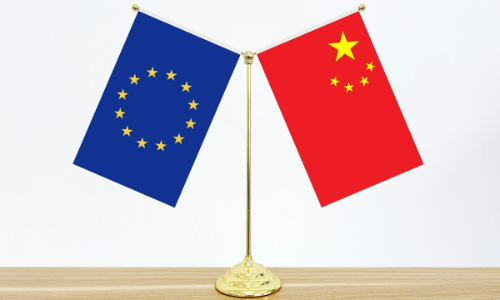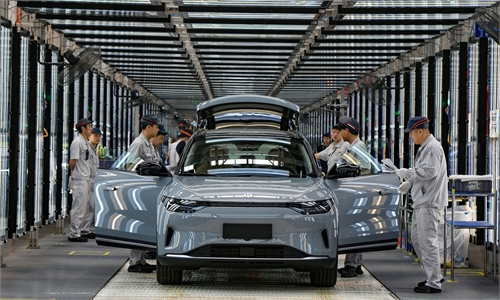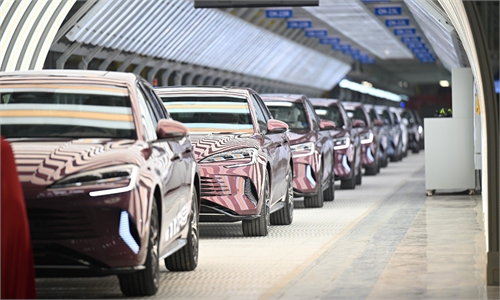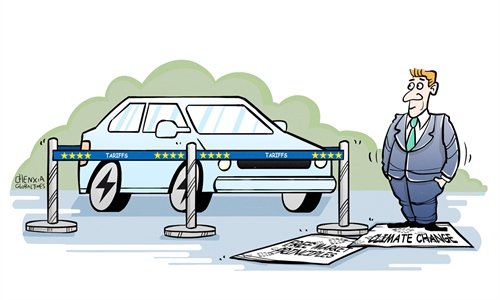Chinese automakers act against EU's tariffs
Brussels should show more sincerity for two sides to reach a balanced, win-win result

China EU Photo:VCG
Chinese automobile companies and industry associations are taking active actions against the EU's provisional tariffs on Chinese electric vehicles (EVs). SAIC Motor Corp said on Friday that it demands that the European Commission (EC) hold a hearing on the tariffs, as the company seeks to further exercise its right to safeguard its own legitimate rights and interests as well as the benefits of its global clients.
China's Foreign Ministry stressed at a regular press conference on Friday that China always believes the two sides should solve trade issues through talks and will take "necessary measures" to firmly safeguard its own legitimate rights and interests.
Observers said the consultations between China and the EU on the bloc's anti-subsidy probe into Chinese EV companies will be very hard, urging the EU to show more sincerity so that the two sides can reach a balanced and win-win result before a final decision is made by the EU in November.
SAIC Motor said in a statement published on Chinese social media platform Sina Weibo on Friday that the EC, the executive body of the EU, revised down the additional tariffs faced by the company to 37.6 percent from 38.1 percent announced in pre-disclosure on June 12 after the company submitted its defense.
SAIC Motor said the EC's anti-subsidy probe involves commercially sensitive information that exceeds the scope of normal investigation, and that there is a mistake with the EC's recognition of subsidies. The EC has also neglected partial information and defense opinions the company submitted during investigations.
The China Chamber of Commerce for Import and Export of Machinery and Electronic Products (CCCME) said on Friday that the EC's recognition of so-called subsidies within Chinese EV firms involved is unreasonable and seriously violates WTO and EU related anti-subsidy rules, urging the EC to correct its mistake as soon as possible.
Representing the Chinese EV industry, CCCME further stated that it will continue to deal with the EC's anti-subsidy investigation, and will firmly protect the legitimate rights and interests of Chinese enterprises through various means.
The EC confirmed provisional import tariffs on a couple of Chinese EV manufacturers starting from Thursday, despite strong opposition from government officials and major industry players within the bloc.
"In the upcoming four months, there is still a lot of room for consultations and negotiations between China and the EU so that a solution acceptable to both sides can be found," Liang Ming, director of the Chinese Academy of International Trade and Economic Cooperation's Institute of International Trade of the Ministry of Commerce, told the Global Times.
The EU has announced multiple restrictive trade measures against China since the beginning of the year, but China has continued to expand imports from the EU, demonstrating its positive attitude in dealing with the EU, Liang said.
He Weiwen, a senior fellow from the Center for China and Globalization, told the Global Times on Friday that the EU's protectionist move will not only make European consumers pay higher prices for EVs but also harm some European companies' interests, since a large proportion of the Chinese EVs exported to the EU involves products made by European companies in China.
If China and the EU can solve the trade dispute through talks, it will bring benefits for both sides, He said, urging the EU to show more sincerity in consultations with China.
He said China and the EU have formed a new-energy vehicle industrial chain that is highly interdependent. For example, Chinese leading battery manufacturer CATL has invested in the EU while a large number of German automakers have also seen robust growth in China over recent years.
By jointly developing comprehensive and large-scale new-energy vehicle industrial and supply chains, China and the EU will boost green, low-carbon development, bring sustained prosperity for both sides' auto industries and contribute to the world's automobile industry upgrade, He said.
Some European leaders and businesses have expressed opposition to the EC's move, saying it will harm both the European auto industry and consumers, as well as undermine efforts to realize carbon neutrality.
BMW Group Chairman Oliver Zipse said in a statement sent to the Global Times that the EU's approach is impractical and potentially damaging to European car manufacturers engaged in global operations.
Mercedes-Benz Group told the Global Times that the company always "supports a liberal trade regulation based on WTO rules. This includes the principle that all participants find the same conditions. Free trade and fair competition ensure prosperity, growth and innovation."
If a general trend toward protectionism gains a foothold, this will have negative economic consequences for all stakeholders involved, Mercedes-Benz warned.
We should firmly safeguard our rights to conduct normal trade, and will not allow other countries to randomly attach so-called "overcapacity" and "subsidy advantage" labels to China. If the US and the EU insist on unreasonable crackdowns on Chinese companies, we could take countermeasures in line with WTO rules, Liang said.




